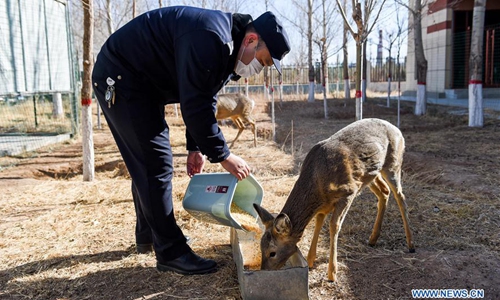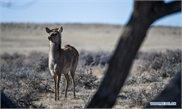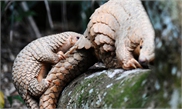
A police officer feeds a roe deer at the Forest Public Security Bureau of Sunite Right Banner in Xilingol League, north China's Inner Mongolia Autonomous Region on March 13, 2020. In recent years, the Forest Public Security Bureau of Sunite Right Banner has strengthened its patrolling efforts and rescued many wild animals. (Xinhua/Lian Zhen)
North China's Tianjin Municipality said on Wednesday that it will ban the hunting of terrestrial wildlife within the whole city over the next five years, effective immediately. Experts said that the move is part of a nationwide effort to eradicate the illegal trade and consumption of wildlife and better protect wild animals.
The Tianjin Municipal Bureau of Planning and Natural Resources issued a notice, saying that it would adjust the banned area and period for terrestrial wildlife in the city.
The banned hunting area has been expanded from certain nature reserves, wetlands, forests and shelterbelts to the whole city, and the banned hunting time will cover the whole year for the coming five years, instead of the specific periods of March to May and September to November.
The regulation is a response to the city's rising pressure to protect wildlife, as well as epidemic prevention and control work, as the number and territory of wild animals have both increased in the city, according to the notice.
The move will help crack down on the illegal hunting of terrestrial wildlife, protect the environment, and further eradicate the illegal trade and consumption of wild animals, Shi Kun, director of the Wildlife Research Institute of Beijing Forestry University, told the Global Times on Wednesday.
"No hunting, no eating. The ban on hunting wildlife is in line with the country's determination to prohibit the eating of wildlife, especially after the COVID-19 outbreak triggered public concern over zoonotic infectious diseases," he said.
China's top legislature passed a regulation on February 24, banning the consumption of terrestrial wild animals "of important ecological, scientific and social value", and also the hunting, trading and transportation of wildlife that naturally grows and breeds in the wild environment.
During the Two Sessions held in May, the most important political events in the country, wildlife protection was a hot topic for policymakers, especially regarding hunting, trade and consumption.
Previous to Tianjin's move, many other cities had announced policies to establish or expand banned areas and times for wildlife hunting, including Beijing, Weifang in East China's Shandong Province, and Shantou in South China's Guangdong Province.
Beijing issued a new wildlife protection regulation on June 3, which stipulates that hunting terrestrial wildlife is prohibited throughout the city, with no specific time limit.
Under the new provisions, those who hunt or kill wildlife will face confiscation of the animals. They may also face fines or criminal charges. The penalties will apply to wildlife hunters even if they don't catch anything.



